NGC 3921, Spirit Galaxy

NGC 3921, Spirit Galaxy
More Posts from Astrosciencechick and Others

Celestial Buddy Earth peers out at Mother Earth from the ISS after hitching a ride on this weeks SpaceX Dragon test flight

Melotte 15, Inside the Heart

A fleeting moment in time
The faint, ephemeral glow emanating from the planetary nebula ESO 577-24 persists for only a short time – around 10,000 years, a blink of an eye in astronomical terms. ESO’s Very Large Telescope captured this shell of glowing ionized gas – the last breath of the dying star whose simmering remains are visible at the heart of this image. As the gaseous shell of this planetary nebula expands and grows dimmer, it will slowly disappear from sight.
This stunning planetary nebula was imaged by one of the VLT’s most versatile instruments, FORS2. The instrument captured the bright, central star, Abell 36, as well as the surrounding planetary nebula. The red and blue portions of this image correspond to optical emission at red and blue wavelengths, respectively.
An object much closer to home is also visible in this image – an asteroid wandering across the field of view has left a faint track below and to the left of the central star. And in the far distance behind the nebula a glittering host of background galaxies can be seen. Credit: ESO
Read more ~ phys.org

55 Nights with Saturn

NGC 1309: Spiral Galaxy and Friends
Image Credit: Hubble Legacy Archive, ESA, NASA; Processing - Jeff Signorelli
'Space Butterfly' Is Home to Hundreds of Baby Stars

What looks like a red butterfly in space is in reality a nursery for hundreds of baby stars, revealed in this infrared image from our Spitzer Space Telescope. Officially named Westerhout 40 (W40), the butterfly is a nebula — a giant cloud of gas and dust in space where new stars may form. The butterfly’s two “wings” are giant bubbles of hot, interstellar gas blowing from the hottest, most massive stars in this region.
Besides being beautiful, W40 exemplifies how the formation of stars results in the destruction of the very clouds that helped create them. Inside giant clouds of gas and dust in space, the force of gravity pulls material together into dense clumps. Sometimes these clumps reach a critical density that allows stars to form at their cores. Radiation and winds coming from the most massive stars in those clouds — combined with the material spewed into space when those stars eventually explode — sometimes form bubbles like those in W40. But these processes also disperse the gas and dust, breaking up dense clumps and reducing or halting new star formation.
Make sure to follow us on Tumblr for your regular dose of space: http://nasa.tumblr.com
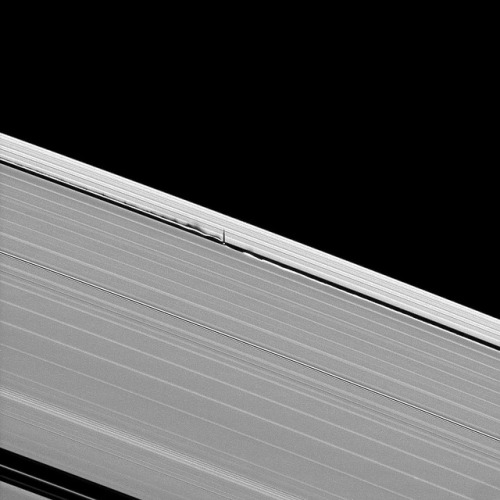
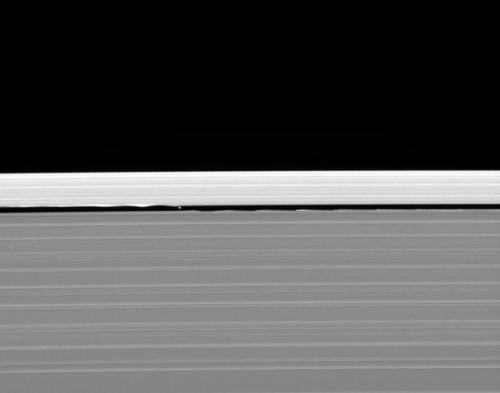
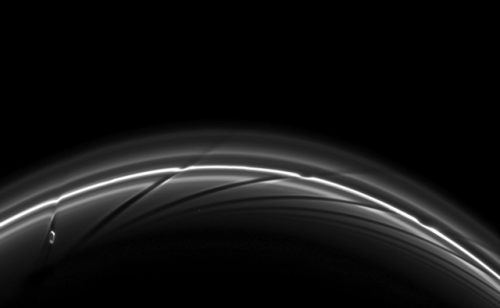
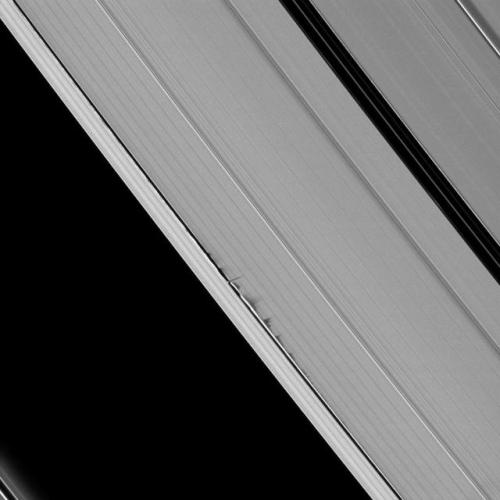
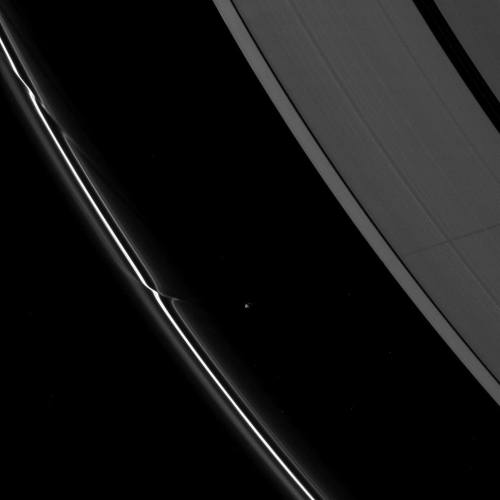
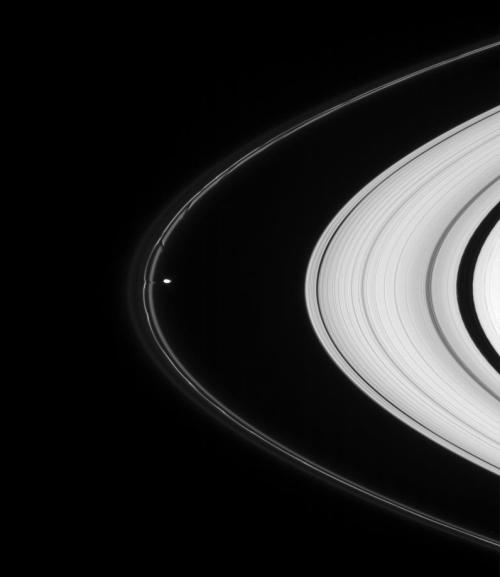

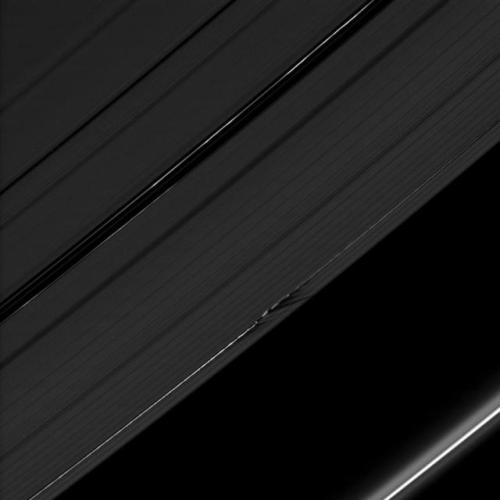

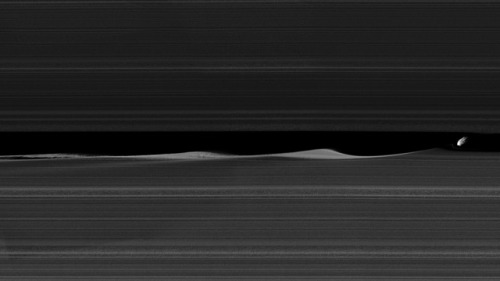
Ripples in the rings of Saturn caused by the orbit of small moons (Pandora, Pan, Prometheus, Atlas, Daphnis, etc.)

To see the animation click here
Image credit: NASA/JPL/Cassini & Planetary Ring Image of the Day

photography / hipster / indie / grunge
🖤🖤🖤
“There are people who are always in love with the sky, no matter the weather. One day you will find someone who’ll love you the same way.”
Omg I’m dying
my favorite thing about the spanish harry potter translation is that instead of calling voldemort “the dark lord,” they call him señor tenebroso, which basically means “mr. spooky”
-
 wingedmoonruins reblogged this · 1 year ago
wingedmoonruins reblogged this · 1 year ago -
 thatgirljonni liked this · 4 years ago
thatgirljonni liked this · 4 years ago -
 isolated-systems reblogged this · 4 years ago
isolated-systems reblogged this · 4 years ago -
 jacy-lasly liked this · 4 years ago
jacy-lasly liked this · 4 years ago -
 blewd-archive liked this · 4 years ago
blewd-archive liked this · 4 years ago -
 nullheaven reblogged this · 4 years ago
nullheaven reblogged this · 4 years ago -
 deepspacelove liked this · 4 years ago
deepspacelove liked this · 4 years ago -
 fouldeputypaperpizza liked this · 4 years ago
fouldeputypaperpizza liked this · 4 years ago -
 3r4d reblogged this · 4 years ago
3r4d reblogged this · 4 years ago -
 3r4d reblogged this · 4 years ago
3r4d reblogged this · 4 years ago -
 meditationrelaxationmusic reblogged this · 4 years ago
meditationrelaxationmusic reblogged this · 4 years ago -
 spaxey reblogged this · 5 years ago
spaxey reblogged this · 5 years ago -
 spaxey reblogged this · 5 years ago
spaxey reblogged this · 5 years ago -
 spaxey reblogged this · 5 years ago
spaxey reblogged this · 5 years ago -
 spaxey reblogged this · 5 years ago
spaxey reblogged this · 5 years ago -
 whydoieventrywithanusername liked this · 5 years ago
whydoieventrywithanusername liked this · 5 years ago -
 nekoshogun4 liked this · 5 years ago
nekoshogun4 liked this · 5 years ago -
 apenasvivasblog-blog liked this · 5 years ago
apenasvivasblog-blog liked this · 5 years ago -
 thegreatdestroyermrselfdestruct reblogged this · 5 years ago
thegreatdestroyermrselfdestruct reblogged this · 5 years ago -
 thegreatdestroyermrselfdestruct liked this · 5 years ago
thegreatdestroyermrselfdestruct liked this · 5 years ago -
 dizzymob reblogged this · 5 years ago
dizzymob reblogged this · 5 years ago -
 dizzymob liked this · 5 years ago
dizzymob liked this · 5 years ago -
 l1terat1 reblogged this · 5 years ago
l1terat1 reblogged this · 5 years ago -
 l1terat1 liked this · 5 years ago
l1terat1 liked this · 5 years ago -
 screechinggoose liked this · 5 years ago
screechinggoose liked this · 5 years ago -
 may-fires reblogged this · 5 years ago
may-fires reblogged this · 5 years ago -
 yyoubrokeme liked this · 5 years ago
yyoubrokeme liked this · 5 years ago -
 pitbull778 liked this · 5 years ago
pitbull778 liked this · 5 years ago -
 mkhardyphotography liked this · 5 years ago
mkhardyphotography liked this · 5 years ago -
 sankibirazahu liked this · 6 years ago
sankibirazahu liked this · 6 years ago -
 sibell-t liked this · 6 years ago
sibell-t liked this · 6 years ago -
 hurtworld reblogged this · 6 years ago
hurtworld reblogged this · 6 years ago -
 dezansante liked this · 6 years ago
dezansante liked this · 6 years ago -
 hurtworld reblogged this · 6 years ago
hurtworld reblogged this · 6 years ago -
 craveemetakeeme reblogged this · 6 years ago
craveemetakeeme reblogged this · 6 years ago